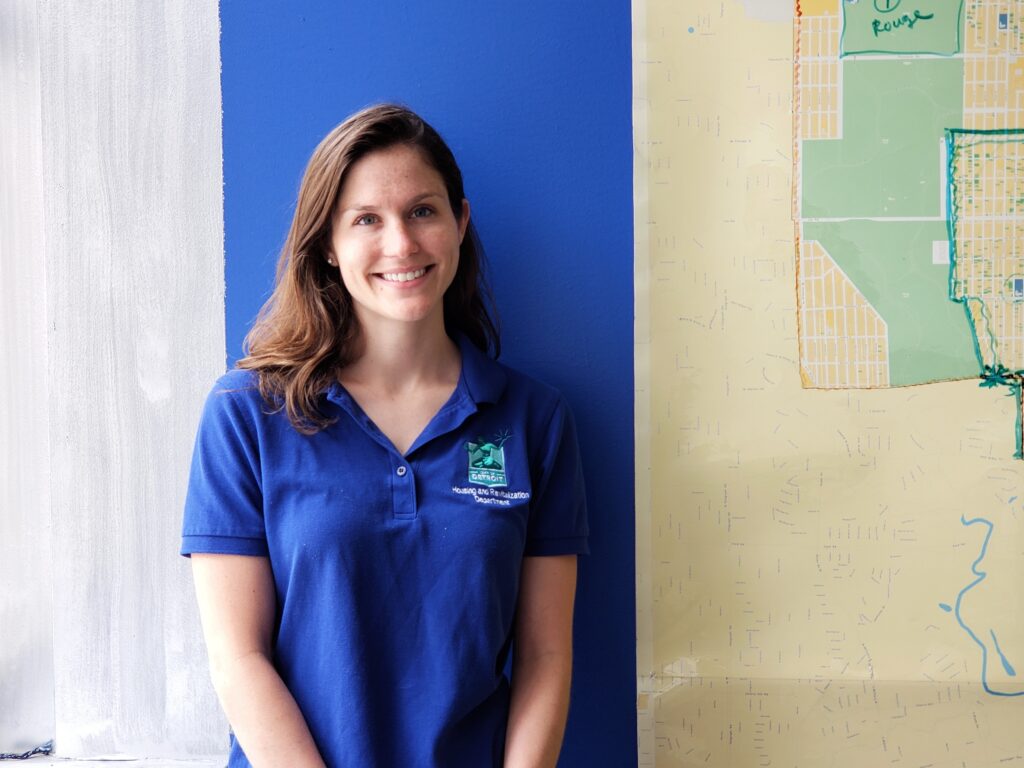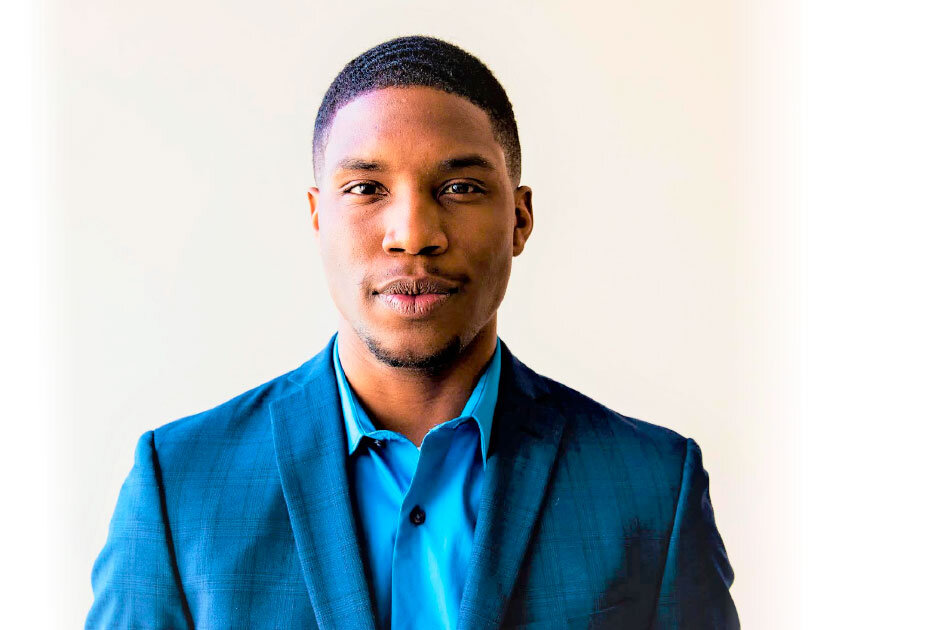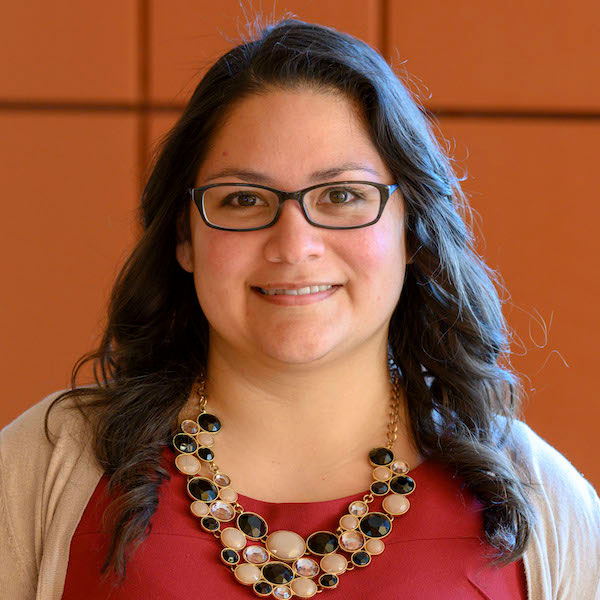Detroit Economic Mobility Policy Fellows use U-M support to tackle city’s pressing issues
Contact: Lauren Slagter, lslag@umich.edu
DETROIT – From navigating the best ways to address homeless encampments to assessing home repair needs and reducing disparities in internet access, economic mobility policy fellows are taking on some of the City of Detroit’s most-pressing issues.
The City of Detroit and the University of Michigan’s Poverty Solutions initiative created a unique fellowship program that embeds fellows in city departments to focus on strategic economic mobility initiatives city staff may not otherwise have the capacity to address. The fellows have the benefit of research support and access to experts at U-M to guide their work.
“We want a direct line of communication between the fellows and our staff so when they have research questions or data needs, they can look to us right away,” said Patrick Cooney, assistant director of Poverty Solutions’ Detroit Partnership on Economic Mobility, which facilitates the fellowship program.
So far, the partnership has resulted in three two-year fellowships focused on affordable housing, digital inclusion, and homelessness. The fellows work full-time at Detroit’s Coleman A. Young Municipal Center.
Poverty Solutions, U-M’s presidential poverty research initiative started in 2016, funds the affordable housing policy fellowship. The digital inclusion policy fellowship and homelessness policy fellowship are supported by the Knight Foundation and Quicken Loans, respectively.
Julie Schneider, deputy director of Detroit’s Housing and Revitalization Department, helped start the fellowship program in 2018, a few months after Poverty Solutions and the City of Detroit began their formal partnership.
Schneider holds master’s degrees in public policy and urban planning from U-M and supervises the affordable housing fellow. She knows first-hand the benefits of this type of opportunity from her time as a Presidential Management Fellow at the U.S. Department of Housing and Urban Development.
“I think we all will benefit from having programs like this that help to introduce new graduates into the field in a way where they can get immediate exposure to strategy development and program development,” she said.
Cooney sees opportunities to add more fellow positions to address issues like youth employment.
“We will often talk about the program as one of the major successes of the partnership,” he said. “It has, thus far, succeeded in accomplishing what we wanted it to, which was to have highly-capable people focus on strategic projects the city otherwise couldn’t focus on.”
Here, you can get to know each of the Detroit policy fellows and take a closer look at what their work means for Detroiters.
 Affordable housing: Karen Otzen
Affordable housing: Karen Otzen
Karen Otzen, who has a master’s degree in urban and regional planning from U-M, was the first fellow hired in June 2018. She’s in the final stages of an assessment of single-family home repair needs and available home repair assistance in Detroit.
Otzen’s work led to recommendations on ways to serve more people with the available home repair funds and the creation of a Detroit Home Repair Resource Guide to help service providers and community groups better coordinate their resources and refer people to available assistance.
“One of the major things I learned was just how widespread the need for home repair is in Detroit and how few resources exist,” Otzen said.
She said the fellowship has taught her to act as a “bridge” between the city and U-M. Poverty Solutions provided her with guidance on writing policy briefs, connected her with professors who can lend their expertise, and assigned research assistants to support her work.
“It’s been nice to have colleagues at Poverty Solutions who are working on addressing poverty in other areas—like health or workforce development—and be able to see how my work in housing fits into a bigger picture,” she said.
Schneider said it’s helpful to have someone dedicated to identifying needs within the city’s housing programs and proposing evidence-based ways to meet those needs.
“Going forward, because of (Otzen’s) work, we’ve been able to demonstrate the value of spending time evaluating programs,” Schneider said. “It will help us to improve our programs and make sure they are meeting our stated goals.”
 Digital inclusion: Joshua Edmonds
Digital inclusion: Joshua Edmonds
Before moving to Detroit, Joshua Edmonds worked at The Cleveland Foundation to address the digital divide in northeast Ohio. He started as the digital inclusion fellow in February, and shortly afterward, the City of Detroit named him director of digital inclusion.
So far, Edmonds, who has a master’s degree in public policy from Howard University, has met with people from more than 520 Detroit businesses, nonprofits, community groups, government agencies, foundations, and other stakeholders.
He’s building community support for a forthcoming digital equity and inclusion strategy for the City of Detroit, where about 40% of residents don’t have access to broadband internet.
“I think in the past, people were trying to do a clearinghouse of who is a digital inclusion organization and who isn’t,” Edmonds said. “If you are within the boundaries of Detroit, you are a stakeholder to me, and we’ll figure out a way to work together.”
Poverty Solutions showed him new ways to leverage public policy to address the digital divide, he said, and he’s connected with U-M faculty and staff to talk about the role of technology in fields like health, business, and social work.
Beth Niblock, Chief Information Officer for the City of Detroit, said having a director of digital inclusion is essential to making progress on the issue.
“There are really good community groups doing really good work. But from the city’s perspective, we need to say this is important and we need somebody dedicated full-time to digital equity and inclusion,” she said. “We’ve got to do something with that because obviously we don’t want folks to be left behind—whether it’s kids trying to do homework or adults trying to apply for jobs online.”
 Homelessness: Laura Urteaga-Fuentes
Homelessness: Laura Urteaga-Fuentes
Laura Urteaga-Fuentes brings six years of experience working to end homelenssness to the Detroit policy fellowship. Prior to starting her fellowship in March, she provided policy expertise for Washtenaw County’s homeless response system, and she holds a master’s degree in social work from U-M.
In Detroit, Urteaga-Fuentes has focused her efforts so far on establishing a clear policy and procedures for addressing homeless encampments in the city when they cause a threat to the health and safety of residents in the encampment or the larger community.
Working alongside service providers has been critical to the success of that work, she said, and now she’s bringing together key stakeholders and people with lived experience with homelessness to offer their feedback on her proposed policy.
Meghan Takashima, Detroit’s homelessness solutions director, sees the fellowship program as a path to build leadership capacity and cultivate talent to work in the City of Detroit.
“Having someone who’s really steeped in the knowledge of how to approach people experiencing homelessness made the (encampment) policy of higher quality than it might have been otherwise,” said Takashima, who supervises the homelessness fellow. “I don’t think we would have had the capacity to do that otherwise.”
Poverty Solutions has provided Urteaga-Fuentes with research assistants to support her work and connected her to experts in the field.
“Poverty Solutions and U-M are so well-connected to similar efforts that are happening at the state and even at the national level, so they’re able to plug me in with people who are doing research or on-the-ground work,” she said. “I’m able to learn from that and really infuse it into my work.”
